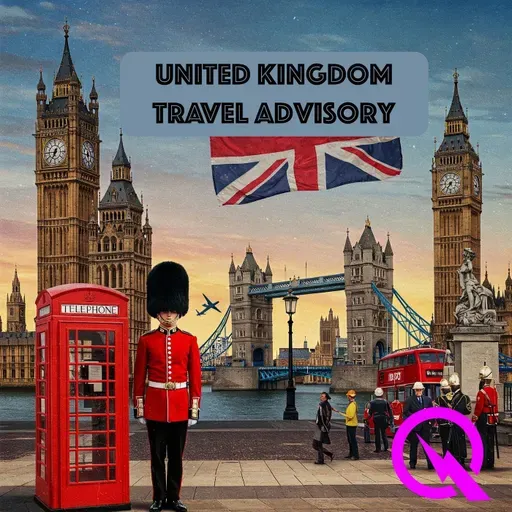
11 October 2025
UK Travel Advisory 2025: Essential Safety Tips for Visitors Navigating Terrorism Risks and Petty Crime Challenges
United Kingdom Travel Advisory
About
Travelers considering a visit to the United Kingdom in late 2025 should be aware that the US Department of State has placed a Level 2 travel advisory on the UK, meaning visitors are urged to exercise increased caution primarily due to the ongoing risk of terrorism. This status is common for countries with advanced infrastructure but where credible threats exist, and it aligns with periodic updates meant to keep travelers informed of any developments. The advisory highlights that while travel is not discouraged, heightened situational awareness is essential, especially in crowded public locations and during large events. According to the US advisory and echoed by the UK’s own Joint Terrorism Analysis Centre, there remains a substantial to severe threat from terrorism, with attacks deemed likely, most often in major population centers like London, Manchester, Birmingham, and Glasgow. Intelligence services in the UK are robust and frequently disrupt planned attacks, but the risk cannot be eliminated entirely.
The current national terrorism threat level as published by the British Home Office is 3, or “substantial,” which means an attack is assessed as likely. A separate rating for Northern Ireland stands at 4, or “severe,” reflecting more acute risks from dissident republican groups targeting police and military, especially around politically significant anniversaries or demonstrations. Foreign travelers are rarely targeted deliberately in these incidents, but caution is urged, particularly in historically tense areas of Northern Ireland or during major public gatherings.
Petty crime is another consideration for visitors. Government sources including the Canadian and Australian foreign affairs offices warn that pickpocketing, purse snatching, and mobile phone theft are persistent issues, especially in crowded tourist spots in London and at popular events across the UK. Vigilance with personal belongings and awareness in busy public spaces are recommended.
In terms of health and logistics, the UK maintains a strong National Health Service, and emergency medical services are available to all, including tourists, but non-emergency care or medication may involve costs for non-residents. Procuring comprehensive travel insurance before departure is considered best practice; it should cover medical needs, cancellation, and personal protection. Travelers are also advised to check entry requirements, ensure passport validity, consider the need for new digital travel authorizations being rolled out across Europe in late 2025, and be ready for enhanced security screening at airports and border entries.
Recent events have prompted periodic demonstration alerts, particularly in London. Demonstrations can be unpredictable and sometimes disrupt transport, so it’s advised to avoid protest hotspots, monitor local media, and follow guidance from local authorities at all times. Visitors should also be mindful of UK drink safety advisories, particularly concerning the risks of spiked or contaminated drinks, and familiarize themselves with local emergency protocols and contact numbers.
Overall, travel to the United Kingdom remains fundamentally safe, with robust systems in place for both health and security. However, listeners should adopt a mindset of increased caution: monitor official travel sites for updates, insure your trip, stay aware of your surroundings, safeguard your possessions, and heed all local advisories and demonstration alerts. This approach ensures that your visit is both enjoyable and secure in an unpredictable global environment.
This content was created in partnership and with the help of Artificial Intelligence AI
The current national terrorism threat level as published by the British Home Office is 3, or “substantial,” which means an attack is assessed as likely. A separate rating for Northern Ireland stands at 4, or “severe,” reflecting more acute risks from dissident republican groups targeting police and military, especially around politically significant anniversaries or demonstrations. Foreign travelers are rarely targeted deliberately in these incidents, but caution is urged, particularly in historically tense areas of Northern Ireland or during major public gatherings.
Petty crime is another consideration for visitors. Government sources including the Canadian and Australian foreign affairs offices warn that pickpocketing, purse snatching, and mobile phone theft are persistent issues, especially in crowded tourist spots in London and at popular events across the UK. Vigilance with personal belongings and awareness in busy public spaces are recommended.
In terms of health and logistics, the UK maintains a strong National Health Service, and emergency medical services are available to all, including tourists, but non-emergency care or medication may involve costs for non-residents. Procuring comprehensive travel insurance before departure is considered best practice; it should cover medical needs, cancellation, and personal protection. Travelers are also advised to check entry requirements, ensure passport validity, consider the need for new digital travel authorizations being rolled out across Europe in late 2025, and be ready for enhanced security screening at airports and border entries.
Recent events have prompted periodic demonstration alerts, particularly in London. Demonstrations can be unpredictable and sometimes disrupt transport, so it’s advised to avoid protest hotspots, monitor local media, and follow guidance from local authorities at all times. Visitors should also be mindful of UK drink safety advisories, particularly concerning the risks of spiked or contaminated drinks, and familiarize themselves with local emergency protocols and contact numbers.
Overall, travel to the United Kingdom remains fundamentally safe, with robust systems in place for both health and security. However, listeners should adopt a mindset of increased caution: monitor official travel sites for updates, insure your trip, stay aware of your surroundings, safeguard your possessions, and heed all local advisories and demonstration alerts. This approach ensures that your visit is both enjoyable and secure in an unpredictable global environment.
This content was created in partnership and with the help of Artificial Intelligence AI